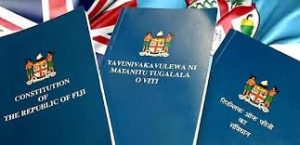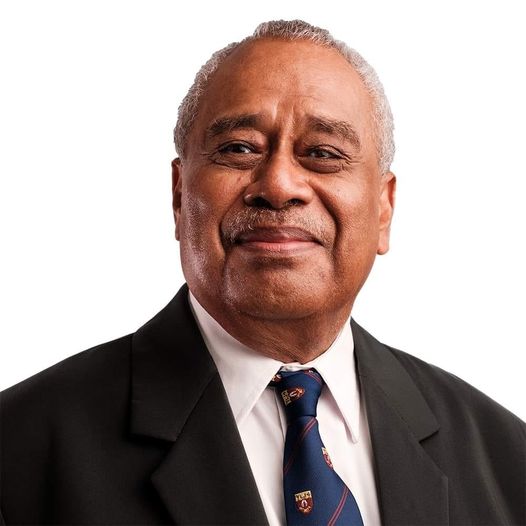Unity Fiji leader, Savenaca Narube has criticised Fiji’s coalition government for failing to address the country’s 2013 Constitution, accusing them of inaction and political posturing.
Narube, whose party announced in May its intent to challenge the Constitution’s legality in court, expressed concern over the government’s lack of progress on a key campaign promise to review the document within 100 days of taking office.
“The entire country seems to be waking up to the urgent need to remove the imposed 2013 Constitution since Unity Fiji announced in May that it will challenge its legality in Court.
We of course welcome the increase in the national interest, but we must do it with the right intentions,” stressed Savenaca Narube, the leader of Unity Fiji.
Narube added, “I am not sure what the coalition Government has been doing on this important national issue. We watched Cabinet celebrating its performance with a lavish dinner with their spouses. In the 2022 election campaign, the parties in the coalition Government announced that it would review the imposed Constitution within 100 days of forming government which is long gone.
It begs the questions: What performance was the Cabinet celebrating? What has this Government been waiting for? If Unity Fiji had not launched its initiative, I am not sure if the Government would have said let alone done anything.”
“The recent lecture by Professor Anthony Regan was the first holistic evaluation of the options for removing or amending the imposed 2013 Constitution. Given the importance of this task, why didn’t Government or the legal fraternity in Fiji come up with a legal analysis before? Were they waiting for Unity Fiji to take the lead?” said Narube in a statement.
The Leader of Unity Fiji said that the Party had identified the provisions that it wanted to review in the 2013 imposed Constitution.
“One of them was the role of the military. We therefore read with immense interest the views of former military commanders including the Prime Minister and Viliame Naupoto that they did not agree with the roles of the military in the imposed 2013 Constitution. Why did they not say these things earlier? Now when they are in parliament, were they changing their tunes to gain political milage?
Narube explained, “I sent out many letters in May asking for support to challenge the 2013 Constitution. In that letter, I emphasised that Unity Fiji was not taking the action for political gamesmanship. I stressed that the Constitution is a major barrier to national unity and prosperity.”
“Unity Fiji had indicated in the 2022 election campaign that it will challenge the 2013 Constitution. We are simply implementing our promise to the people even when we are not in parliament. It reflects the high value that Unity Fiji places on our promises to the people. Unfortunately, this cannot be said of the parties in the coalition Government.”
“Let us accomplish this important national issue for the right reasons and not because of political manoeuvring. We must get the process right. We must seek the strong support of the people. We must ensure that we adopt the best Constitution for the future of our multiracial country.
We must ensure the that the transition to a new Constitution is smooth and stable. Let us not rush blindly into it for political gamesmanship. That would be the worst thing that our leaders can do.”
“Unity Fiji continues to roll out its plans to challenge the 2013 Constitution in a court of law. We want to build national consensus. We want to undertake the widest consultation including with the military.
We want to develop a credible transition plan. We want the support of all communities. We want to adopt the best Constitution for Fiji,” said Narube.

Meanwhile, the Leader of the Opposition Inia Seruiratu has called for a national dialogue, fully disclosing what transpired in the various upheavals of 1987, 2000, and 2006, before any process to amend the 2013 Constitution takes place.
Speaking to FijiLive, Seruiratu said this is fundamental.
“We need to know what happened and who was behind all of these events that shook Fiji, and pushed us backward on the development path.”
“Such a talanoa is the basis for a full transparency and reconciliation process, that will ensure that we come up with, eliminating the causes of past problems.”
He said a revamped constitution should ensure the strengthening of the principle of popular sovereignty which asserts that the people are the ultimate source of power, hence they should have a bigger say in how they are governed.
“… Looking back at our very short history, we have had four constitutions since gaining independence in 1970. These were the 1970, 1990, 1997, and the 2013 Constitution.”
“The 1970 Constitution was purported to be a good balanced document. Yet we had the event of 1987. The 1997 Constitution was said to be close to perfect, still, we had the events of 2000 and 2006.”
“What this demonstrates is that constitutions do not solve problems. However, there must be a shared commitment, built around our diversities, to the aspirations and the spirit of the Constitution, to make it work. What then must be done?”
The Leader of the Opposition called on the Government to show leadership to pave the way forward in ensuring that the outcome of any review is acceptable to all, and is sustainable in the long-term.
Seruiratu said a review of the Constitution must undergo a rigorous process. And the very first step in that process should be the convening of a political dialogue involving our political and community leaders.
“The dialogue must involve higher order proficiencies in honest discussions and emphatic listening, problem identification, constructive feedback, consensus building, and conflict resolution to allow for the identification of the deeper and more complex problems that have plagued us resulting in the undesirable chronic conflicts that we had encountered as a nation.”
“This process calls for political leadership… if we do not get to those root causes of our problems, and seek to collectively find solutions to those problems, the proposed review of our constitution will be just an exercise in futility,” Seruiratu added.
In Parliament last week, Prime Minister Sitiveni Rabuka said he agrees to the proposition to amend the 2013 Constitution and the Government is in favor and commits its efforts to working towards getting it reviewed.
Rabuka said the 2013 Constitution sets out the power to the State, limitations on the State concerning citizens, and must protect the fundamental rights of the citizens and that those who exercise power must be held accountable to the people they serve.
He said it is important in a multi-ethnic, multi-religious, and multi-cultural nation like Fiji, to have a constitution brought about by consensus, and with consent and ownership from all constituent communities.
“We could be blamed for starting all these in 1987, but since then, everyone has realised the dynamics of ethnicities around the world. Whenever we are, if we are involved in the formulation of constitutions, or the foundations of law-making and governing in all governing in all these communities, none of which now is monogamous.”
“I am reminded of what the late Archbishop Petero Mataca said in the process of working towards a constitution after the 1997 Constitution was put out of place. He said that ‘no matter how we come to be in Fiji, or how long we have been here, we are all part of this land. It is the land of our birth or the land of our adoption, the land to which we belong’.”
The Prime Minister said various upheavals happening around the world… I have seen the destruction of ethnic differences being taken out and weaponised.
“I hope we do not get to that stage… That is all about democracy. We sit and listen to the various views whether it is for or against. That is why we are here; to listen to these kinds of opposing views and supporting views, just to how best we can continue to move ahead,” said Rabuka.













